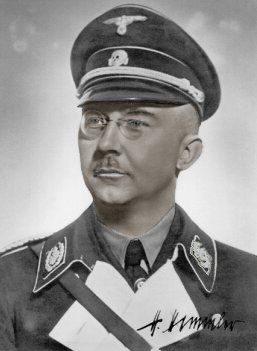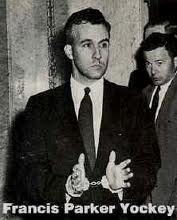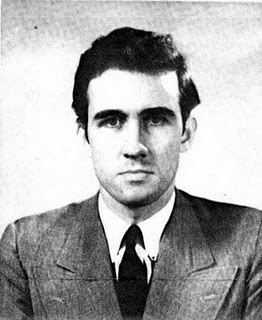or
Why every decent person should become
an anti-Semite: Second reason
A must-read piece by Francis Parker Yockey that I’ve just read thanks to Counter-Currents Publishing (here) throws incredible light on the Jewish Problem. He published it in January 1955: ten years before the 1965 Immigration Act (the subject-matter of a coming entry).

The early American arrived at a land of which he knew nothing. He did not know its geography, its fertility, its climate, its dangers. In the North, he encountered forests, rocky soil, and winters of a rigor he had not known before. In the South, he met with swamps, malaria, and dense forests. Everywhere he encountered the hostile savage with his scalping knife and his warfare against women and children. In little groups, these early Americans cleared the forests, and built homes and forts. The men plowed the fields with rifles slung over their shoulders, and in the house, the wife went about her duties with a loaded weapon near at hand. There were ships to and from Europe, and the colonials could have left their hardships and gone back — but they would not admit defeat.
Out of these colonials was bred the Minute Man. Minute Man! These American farmers were ready at a minute’s notice to abandon the plow and seize the gun. They knew that the hour of their political independence was at hand and instinctively they prepared for it. When the moment arrived, with a British order to arrest two of their leaders, the Minute Men assembled before daybreak at Lexington to face the British force sent to seize them. Though heavily outnumbered they stood their ground in the face of Major Pitcairn’s order to disperse. “If they mean to have a war,” said Captain John Parker, leader of the Minute Men, “let it begin here!”
Begin it did, and for eight long years it continued. Concord, Bunker Hill, Boston, Ticonderoga, Quebec, New York, Long Island, Harlem Heights, White Plains, Fort Lee, Fort Washington, Valley Forge, Trenton, Princeton, Brandywine, Saratoga, Stony Point, Savannah, Camden, The Cowpens, Yorktown — these names recall at once the terrific odds against which the colonials fought, the low points to which their fortunes reached, and the silent and steadfast devotion of the troops. At Valley Forge, the men were but half-clad, and rations, when there was food issued at all, were slim. Sickness was rife, and mortality was high, Yet no one thought of surrender. General Washington said of them: “Naked and starving as they are we cannot enough admire the incomparable patience and fidelity of our soldiery.”
No nation has produced individual soldiers to excel Nathaniel Greene, General Know, General Sullivan, John Stark, Nicholas Herkimer, Anthony Wayne, Daniel Morgan, John Paul Jones, nor greater patriots than John Dickinson, Richard Henry Lee, John Adams, Benjamin Franklin, John Rutledge. These are but a few. The spirit which animated these heroes is part of the white race, and it will last while this race lasts. It waits for its reawakening upon the coming of great events to American soil once more. When the fields of this continent are visited once again by the stern creativeness of war — war for the independence and the liberation of the pristine American colonial spirit — the world shall see that Americans are not the weak-willed, self-interested, pleasure-mad morons that Hollywood has tried so desperately to make them.
It was the individual imperialism of the frontiersman-type that actually opened up and conquered the North American continent. Explorers like George Rogers Clark and John Fremont preceded the frontiersman into the wilderness, and he followed into the hostile land with its lurking warlike savages. With slung rifle he took wife and children and all his earthly belongings into the land ahead, unknown, unsettled, unplowed. Daily he surmounted a thousand dangers, he lived in the face of Death. This intrepid type who was at once explorer, warrior, minister, doctor, judge, and settler, advanced until he reached the Pacific, and then he looked toward Alaska and the westward islands.
The tragic defeat of the Federalists by the less worthy among the post-Revolution generation made it possible for sectionalism to arise in America, and out of sectionalism issued the disastrous “War Between the States.” That war proved only that the heroic type of American occurred everywhere in this broad land. The only lesson we can learn from the sacrifice is that big-mouthed agitators of the vicious stamp of Theodore Parker and Horace Greeley are capable of consigning nations to the flames in order to actualize their fantastic egalitarian theories.
During the conquest of the continent, small carping voices were continually raised against the heroic performance. Congressmen laughed at the idea of governing a region so far away as the distant Pacific coast. The Poets Lowell and Whittier and the agitators Garrison and Phillips did their best to bring about a sectional war during all of the 1840s and ’50s. Calhoun’s attempt to annex Texas was defeated by the Congress. Small minds were against the Mexican War and the acquisition of the Southwest. They opposed the acquisition of Hawaii, of the Philippines, of the Cuban protectorate. After the War Between the States, this type of mind, represented by men like Summer and Stevens, wanted to treat the Southerners as an alien and inferior people and to gloat over them while placing the conqueror’s foot on their necks.
This type of mentality still survives in America. Today it still fights against greatness and heroism. Today it teaches the doctrine of liberalism with its pacifism, its love for the inferior and misbegotten, its internationalism which makes a virtue of treason, its hatred of all who possess strong national feelings, its toothless desire for racial equality, and its tolerance of everything and everyone, particularly the alien and the unfit. Today this type of mind — namely, all those to whom liberal doctrines appeal — are working for the anti-American forces, whether consciously or not. The sub-Americans are in the service of America’s inner enemy.
We have seen the spirit of the white race: the spirit of divine discontent and self-help, the spirit of self-reliance, of fearlessness in the face of great danger, the feeling of racial superiority, the urge to great distances and the will to conquer all that lies between, the spirit of the Alamo. To the true American, his is a living, organic, white nation, and not a set of principles, of “four freedoms” or a “world-policeman.” Of this feeling was every great American: Washington, Hamilton, Henry Clay, Robert E. Lee, Sam Houston. The American soldier shows in every war that even today this true American type survives.
But today the true Americans, the former great leaders, have been displaced by Morganthaus, Ezekiels, Paswolskis, Cohens, Frankfurters, Goldsmiths, Lubins, Berles, Schenks, Edelsteins, Baruchs, Goldwyns, Mayers, Strausses, Lilienthals, Hillmans, Rosenmans, Lehmanns, Rosenbergs, Eisenhowers.
We know the true American and we know the liberal — the sub-type within the white race. Let us now look at the third group which came here only yesterday and which today is linked with the liberals, the internationalists, the class-warriors, the subverters, of America’s white, European traditions. This group makes use of American slogans and American ideas, but that cannot conceal its alien provenance. Let us measure the significance of the newcomers and examine their history.
The History of the Jew
The culture which produced the Jewish nation arose in Asia Minor around 100 B.C. This culture produced many nations, all of them, so far as we are concerned, similar to the Jews. These “nations” were not nations at all in our sense of the word, for they had no homeland. Citizenship in this alien type of nation was gained by being a believer in the religion of the group. Jews, Marcionites, Gnostics, Mohammedans — all these were nations, and to all of them membership in the nation was gained by being a believer. Intermarriage with non-believers was forbidden, and this inbreeding for two thousand years has made it possible today to pick out the Jew by his countenance. Thus, for the Jew, race and religion became identical, and if the Jew loses his religion, he loses little for he still remains a Jew by race. The unity of the race is not destroyed even though the great masses of the Jews become atheists.
After the dispersion of the Jews throughout Europe and Russia, they were entirely cut off from any contact with nations similar to themselves. They shut themselves up in the ghettoes of the cities and lived completely unto themselves. There they had their own religion, their own law, their own language, their own customs, their own diet, their own economy. Since they were nowhere at home, everywhere was equally home to them.
The early European nations felt the Jew to be as totally alien as he felt his surroundings to be. The Anglo-Saxons, the Goths, the Lombards, the Franks, all despised the usurious infidel. A popular rhyme of Gothic times portrays the three estates as the creation of God, and the usurious Jew as the creation of the Devil. Crusaders on their way to the Holy Land carried out wholesale massacres of Jews. Every European king at one time or another robbed the Jews and drove them from his domain. For 400 years the Jew was shut out from England. When he was allowed back, centuries more passed before he acquired or wanted civil rights of Englishmen. This persecution of the Jew that went on for 1,000 years took different forms — robbery through forced fines, extortion, exile, massacre — and it has had one determining, unchangeable result: it has reinforced in the Jew his original hatred for Christian civilization to the point where it is the sole content and meaning of his existence. This hatred is the breath of life to the Jew. He wants to tear down everything which surrounds him, every Western form of life, every Western idea. For a thousand years he cringed before the European master, who was so unassailable in his superiority. The figure of Shylock, drinking his gall and biding his time, taking his usury and saving the coins which represented to him the means of his liberation — this is the symbolic figure of the Jew for a thousand years. This consuming hatred on the part of the Jew is one of the most important facts in the world today. The Jew is a world power. How did this come about?
The Rise of the Jew to Power
It was the Industrial Revolution in Europe and America which enabled the Jew, from having been Shylock for a thousand years, the despised and cringing usurer, to become the type of the modern Jew, the cinema dictator, the tyrant of the inmost thoughts of 100,000,000 Americans. The Jew had been thinking in terms of economics and money for a thousand years before Europe and America began to develop a money civilization. Consequently when money stepped out as the supreme force, the Jew shot upward like a meteor. There was still a barrier however to his complete conquest of power. The heathen, the outsider, was still barred from civil rights. Of old he had not sought them, but now they were necessary if he was to conquer the master of yesterday. Nation after nation succumbed to the principles which the butchers of the French Revolution preached, and which the Jew took up and excitedly shouted over the world. A money civilization wants no aristocracy to stand in its way, so Money and Jew preached equality. Nor must there be any barriers to the employment of money, so the Jew preached liberty. He sought to lose his mark as outsider, for in his new role he wanted to be accepted as a member of whatever nation he might be among, so that he might conquer the power for his revenge. So he preached fraternity for others and the brotherhood of man.
But his “equality” meant only a new inequality — the dictatorship of the Master of Money over the economic slave tied to his bench with a wage-chain. His “liberty” meant that the Jew was free to squeeze out the life-blood of nations through usury and financial dictatorship. The “brotherhood of man” — that meant that the Jew was to be accepted as an equal — but that he was to maintain his ancient unity and desire for revenge. Now the point has been reached where he steps out and asks for special privileges — and gets them! Yesterday he denied aristocracy — today he affirms it — and he is the new aristocrat!! Did not Albert Einstein, before whom Americans are supposed to bow and scrape, write in Colliers Magazine an article entitled “Why the Jew is Superior”? And did not the white Americans afraid to think for himself any longer, read it and believe?
The Jew did not conceive nor organize modem industrialism. No more did he organize liberalism. But when these two things had become realities, he cleverly insinuated himself into the new social and economic fabric which arose, and he has now identified himself with the rapacious capitalism of the sweatshops and with the dishonest and revolting “democracy” of the type where Tweedledum opposed Tweedledee, and the Jew cares not which wins for he nominates them both.
There was a great danger to the Jew in this removal of all barriers between him and the host nations. This danger was assimilation of the great mass of Jews. If this were to occur, the Rothschilds, Baruchs, Frankfurters, Rosenmans, Guggenheims, Schiffs, Lehmanns, Cohens — all these would be leaders without followers. They would lose their trustworthy followers who could penetrate everywhere and spread the influence of the Jew. One fruitful source of taxation would be gone. So the word “assimilated” became a term of contempt used by arch-Jews to describe other Jews who were losing their Jewish feelings and instincts. The Jew, with his two thousand years behind him, was faced with a perilous situation. No mere money manipulation could cope with this emergency. In this situation, the Jewish leaders invented Zionism.
Zionism and the Pinnacle of Jewish Power
It was a political master-stroke on the part of the Jew to bring out the movement known as Zionism. Its ostensible aim was to seek a “national home” for the Jew, a plot of ground to which all Jews would theoretically return and there settle. Since the idea seemed to be to make the Jews into a nation like America, one with geographical boundaries, it seemed a praiseworthy movement to Americans. It seemed to promise the end of the Jews as the shifting sand dunes among nations, and to herald their establishment as a civilized nation. Hence unlimited Zionist activity and propaganda could be carried on among the Jews by their leaders, and no suspicion was aroused in the minds of the host nations.
But the real aim of Zionism was merely to save the Jew, wherever he was, from assimilation by the Western peoples, the European and American people. It enabled their leaders to unite the Jews firmly, to prevent assimilation by giving the Jews a political aim to follow. The spurious quality of the movement is shown by the fact that almost no Jews were moved to Palestine. A few only were moved, for commercial and political reasons and to conceal the Zionist fraud, but the millions remained in America and Europe. The real aim of Zionism — to reaffirm and perpetuate the solidarity of the Jew — has been successful. Zionism has become the official policy of the Jewish entity, and its ascendancy means, as far as the simple, ordinary Jew is concerned, that he is an utter slave in the hands of his leaders. It is probably superfluous to mention that no leading Zionist has gone from his position of power in white America back to Palestine. Nor need it be pointed out once more how few out of the millions of Jews driven from Europe have gone to Palestine. Almost to a man, they have come to America, their land of promise, the last base for their power, the last place for their revenge.
The invasion of Palestine, strategically important though it is, nevertheless stands in the shade of the vast invasion of America. During the short half century since Jewry adopted Zionism, some ten millions of Jews have been dumped on the shores of North America to displace Americans biologically and economically, to live parasitically on the American organism, to distort the social and spiritual life of the nation. The volume of the invasion has been such that even the slumbering, politically-unconscious white American has begun to blink his eyes and look around him in amazement, as he becomes gradually cognizant that his native land has passed into the possession of scheming, power-hungry, money-grubbing, total aliens.
The alien has his own press, in which he reveals those things which the democratic-liberal press dutifully conceals at the behest of the Jew. Pick up at random an issue of the Contemporary Jewish Record — that for June 1941. On page 282 we are told how Jewish educators are combating successfully “the un-American movement of 100% Americanism.” On page 259 a member of the American Jewish Committee joyfully reports that because of the hostility between American and Jew the successive waves of Jewish immigrants “will develop into a cohesive American Jewish community.” The article “The Jewish Emigrant — 1941,” describing the arrival of the Jew in America, says: “Our sole conclusion is that when the emigrant has finally arrived at his destination, he can consider himself at the entrance to Heaven” (sic).
Seven million of these immigrants have arrived at their “entrance to Heaven” since 1933. There is admitted hostility between them and their host-people. The Jew opposes 100% Americanism. Yet he calls his arrival here his “entrance to Heaven.” How is this?
The Rising Influence of the Jew in America
The North American continent was discovered, explored, cleared, plowed, and settled by the individual imperialism of members of the European-American white race. The political independence of America was won, and the industrial-technical system of the continent was planned and built by the white race. The American merchant marine was built and sent into the seven seas by white men. Every creative idea in whatever realm — political, economic, technical, religious, legal, educational, social — that has been brought forth on this continent has originated with, and been developed by, members of the white European-American race. America belongs spiritually, and will always belong, to the Western Civilization of which it is a colonial transplantation, and no part of the true America belongs to the primitivity of the barbarians and fellaheen outside of this civilization, whether in Asia Minor, the Far East, or Africa.
And yet, even though the Jew was not present at Valley Forge, even though he was not at New Orleans in 1814, nor at the Alamo, nor at Bull Run or Chancellorsville, nor at Guantanamo Bay or Manila, even though he took no part in the conquest of the continent — in spite of this complete dissociation of the Jew from the American past, it is a stark and gruesome fact that America today is ruled by the Jew.
Where Americans hold office, they hold it at the pleasure of the Jews and use it in deference to his policy. Baruch argues with Roserman on the steps of the White House — once the residence of Washington, Madison, Adams — and the policy of America is thus determined. LaGuardia calls Lehmann by a Yiddish term of abuse in public. As lawyer, the Jew brings in excessive litigation; as judges he imports chicanery into the administration, and has the power to pronounce rules of law for Americans. A rabbi states: “The ideals of Judaism and the ideals of Americanism are one and the same,” And the Jewish Chronicle (April 4, 1919) says: “The ideals of Bolshevism are consonant with the finest ideals of Judaism.” The notorious rabbi Wise announces, “I have been an American for 67 years, but I have been a Jew for 6000 years.” The Jewish Chronicle tells us: “The Jews in America are 100% Jewish and 100% American.” These schizophrenic percentages resolve themselves into the thesis of the rabbis that Judaism, Trotskyist Bolshevism, and Americanism are one and the same. The synagogues have a parade of liberals — sub-Americans with defective instincts — come before them to parrot back at them their own view-point.
The Jew numbers approximately 10% of the North American populations but in the Second World War, a war fought solely for Jewish interests, a war of his fomenting, a war to increase his power, the conscripts in the American Army were only 2% Jewish, according to official records. Neither in his assumed role of American, nor in his actual status as member of the Jewish Culture-State-Nation-Race-People, was he willing to risk his blood, even in his own war. In the fighting forces he limited his participation to the administrative branches: Judge Advocate, Medical, Quartermaster, Finance. In the American Army Jewish conscripts have an unconditional right to a furlough for Passover, for Yom Kippur, for Rosh Hashanah. The induction of Jews into the Army is delayed over Jewish holidays — “to avoid undue hardship.” The Central Conference of American Rabbis in the 47th annual convention in New York addressed a resolution to the American Congress asking that Jews be exempted from conscription “in accordance with the highest interpretation of Judaism”!
In the publicly supported educational institutions for higher learning, the Jew is driving out the native American student. In the free universities, such as Wayne University and City College of New York, the Jew’s possession is complete. The Stock Exchange presents a similar picture. The New York Exchange is dormant on Jewish holidays. The Officers Reserve Corps is ever more penetrated by the Jews. The police forces of the large cities are under his control, and the Federal secret police enforce his bidding. He commands the National Guard in the populous states.
How has this come about? How has the native American been driven from the positions of representation, of power and respect in his own land? How has he been chased out of the professions, out of government, of the universities, out of the sources of public information? How did the interloper from Asia, the ghetto-creature from Kishnev, attain to his eminence whereupon he holds in his hands the decision of war or peace, and decides who are America’s friends and who are America’s enemies?
Two things are responsible for this situation in which America finds itself serving as a mere tool in the hands of an alien. First is Liberalism — the enemy of national greatness, the virus that eats up national feelings. Liberalism is the doctrine that everyone is equal, everyone acceptable, the doctrine that the botched, the misbegotten are equal to the strong and the superior, that there are no foreigners and no distinctions. Liberalism gnaws away at the structure for which patriots and great leaders gave their lives and fortunes. To Liberalism, America is a “melting-pot”, a dump heap for the world’s human refuse. When the white race in Europe drives out the Jew, he goes to America where weak heads and inferiors who are jealous of that to which they are not equal have laid down for him the red carpet of Liberalism, and on this carpet, the Jew has advanced to supreme power in the short half a century since he first discovered that America is a fine host for an enterprising parasite. Liberalism is the inversion of that 100% Americanism which the Jew hates.
But mere Liberalism alone does not account for it. The second factor has been the aggressive unity of the Jew, his cohesiveness born of hate, which has welded him together and organized his forces for his mission of destruction. By virtue of the cohesiveness of the Jewish entity, at once Culture, State, Nation, People, Race, Religion, and Society, the Jew conquered the cinema industry, the news-gathering associations which controls all “news” and journalistic opinion, the periodical and book press, and the radio networks. When it became obvious the “Republican” party was about to lose the 1932 election, he cleverly insinuated himself into the “Democratic” party, and placed his candidate in the Presidency. This was the Revolution of 1933, but since it had occurred in the form of a simple change of parties, the politically-unconscious American remained unaware.
In 1933, there descended upon Washington the swarm led by Baruch, Lehmann, Morgenthau, Frankfurter, Niles, and Rosenman. In their train were thousands of Paswolskis, Messersmiths, Lubins, Berles, Fortases, Lilienthals, Cohens, Ezekiels, Silversteins, et al., and bringing up the procession came enough lesser Jews, deracinated liberals, technocrats, and aliens to double the population of the capital city within a few years.
Between the cracks in the pavement the Jew recruited a thousand sub-Americans as “radio commentators,” newspaper “columnists,” and professional propagandists to disseminate the world-outlook the Jew considered appropriate for the American. A multiplicity of government bureaus came into existence, necessarily staffed with Jews. The Jew sought to bring under his control every factor of public expression and influence, thus to make sure that never again would there be a free national election for he did not intend to relinquish his power, so long dreamt of, and now at last real, through the free play of any constitutional game of parties and majorities. He purged the central government of whoever could not be led by the nose, or bought. Who opposed was shouted down, smeared with vile labels, and so silenced.
Thus America was given a semitic countenance.




